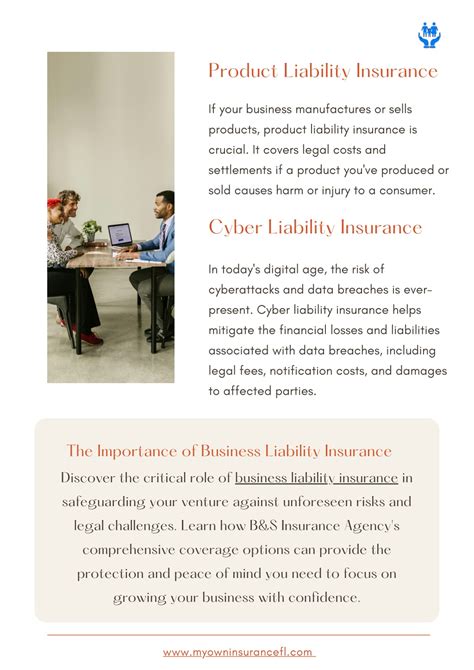Comprehensive Business Insurance

In today's complex business landscape, comprehensive insurance coverage is a necessity for any organization, large or small. With an array of potential risks and liabilities, from natural disasters to cyber threats, businesses need a robust insurance strategy to safeguard their operations, assets, and reputation. This article aims to provide an in-depth exploration of the critical components and benefits of comprehensive business insurance, offering practical insights and guidance for businesses seeking to protect their future.
Understanding the Need for Comprehensive Business Insurance

The world of business is filled with inherent risks that can threaten the stability and success of any organization. From unforeseen events like fires, floods, or theft to more complex challenges like liability claims, data breaches, or employee injuries, the potential for loss is vast. A comprehensive insurance policy acts as a safety net, offering protection and financial support when these events occur.
The primary goal of business insurance is to mitigate financial risks and ensure business continuity. It provides a financial safety net, allowing businesses to recover from losses and continue operations without significant disruption. Moreover, it helps businesses maintain their reputation by ensuring they can meet their financial obligations, even in the face of adversity.
Additionally, comprehensive insurance is a vital tool for risk management. It enables businesses to identify and understand the various risks they face, and then develop strategies to mitigate or manage these risks effectively. By doing so, businesses can not only protect their assets and interests but also make more informed decisions to enhance their overall risk profile.
Key Components of a Comprehensive Business Insurance Policy

A comprehensive business insurance policy is tailored to the unique needs and risks of a specific business. It typically includes a combination of the following coverage types:
Property Insurance
Property insurance is a cornerstone of business insurance, providing protection for a business’s physical assets. This includes coverage for the business premises, equipment, inventory, and any other tangible assets the business owns. Property insurance covers losses from a range of perils, including fire, theft, vandalism, and natural disasters like hurricanes or earthquakes.
For instance, consider a manufacturing business with a large warehouse full of raw materials and finished goods. In the event of a fire, property insurance would cover the cost of repairing or rebuilding the warehouse and replacing the damaged inventory, ensuring the business can resume operations as soon as possible.
Liability Insurance
Liability insurance is another critical component, protecting businesses from financial losses arising from claims of negligence or wrongdoing. This can include personal injury claims, property damage claims, or lawsuits arising from a business’s products or services. Liability insurance is particularly important for businesses that interact directly with the public or have a high risk of causing harm, such as construction companies or product manufacturers.
Imagine a scenario where a customer slips and falls in a retail store, injuring themselves. Liability insurance would cover the cost of any legal fees and settlements arising from the incident, protecting the business from potentially devastating financial consequences.
Business Interruption Insurance
Business interruption insurance is designed to cover a business’s lost income and ongoing expenses in the event that its operations are disrupted due to a covered peril. This could be due to a fire that renders the business premises unusable, a cyberattack that shuts down computer systems, or a natural disaster that prevents employees from reaching the workplace.
For example, a restaurant affected by a severe storm might need to close its doors for several weeks to make repairs. Business interruption insurance would provide financial support to cover the restaurant's ongoing expenses, such as rent and employee salaries, during this period, ensuring the business can survive the disruption.
Cyber and Data Breach Insurance
In today’s digital age, cyber risks are a growing concern for businesses. Cyber and data breach insurance provides protection against the financial losses arising from cyberattacks, data breaches, or other forms of cybercrime. This coverage can include the cost of investigating and containing a breach, as well as legal fees, regulatory fines, and notification expenses.
A cybersecurity breach can be devastating for a business, not just financially but also in terms of reputation and customer trust. Cyber insurance can help businesses manage these risks and recover from a breach, ensuring they can continue operating and maintain their standing in the marketplace.
Employee Benefits and Workers’ Compensation
Providing comprehensive employee benefits and workers’ compensation coverage is essential for businesses to protect their most valuable asset: their workforce. Employee benefits can include health insurance, life insurance, disability coverage, and retirement plans. Workers’ compensation insurance, meanwhile, provides coverage for employees who are injured or become ill due to their work, ensuring they receive medical treatment and wage replacement.
By offering competitive employee benefits and providing workers' compensation coverage, businesses can attract and retain top talent, boost morale, and ensure a safe and healthy workplace. This not only benefits the employees but also the business as a whole, contributing to a more productive and efficient workforce.
Commercial Auto Insurance
Commercial auto insurance is crucial for businesses that own or operate vehicles, whether it’s a single delivery van or a fleet of trucks. This coverage protects the business against financial losses arising from accidents involving company vehicles, including liability claims, property damage, and medical expenses.
For example, a delivery service that relies on a fleet of vans to transport goods could face significant financial losses if one of its vehicles is involved in an accident. Commercial auto insurance would cover the cost of repairing or replacing the damaged vehicle, as well as any legal fees or settlements arising from the accident.
Professional Liability Insurance (Errors and Omissions)
Professional liability insurance, also known as errors and omissions (E&O) insurance, is essential for businesses that provide professional services or advice. This coverage protects the business against claims of negligence, errors, or omissions in the services they provide. It’s particularly important for industries like consulting, accounting, law, or healthcare, where the advice or services provided can have significant financial or legal implications.
Imagine a scenario where a client sues an accounting firm, alleging that an error in their tax preparation caused significant financial losses. Professional liability insurance would cover the cost of defending the firm against the lawsuit and any settlements or judgments awarded to the client.
Benefits of Comprehensive Business Insurance
Comprehensive business insurance offers a wide range of benefits that extend beyond financial protection. Here are some key advantages:
- Risk Management and Mitigation: A comprehensive insurance policy helps businesses identify and understand the various risks they face. By doing so, businesses can develop strategies to mitigate or manage these risks effectively, reducing the likelihood and impact of potential losses.
- Financial Stability and Continuity: In the event of a covered loss, comprehensive insurance provides the financial support necessary to keep the business afloat. This includes coverage for property damage, liability claims, business interruption, and more. With this financial safety net, businesses can recover and continue operations without significant disruption.
- Reputation Protection: A major loss or liability claim can damage a business's reputation, particularly if it is unable to meet its financial obligations. Comprehensive insurance ensures businesses can meet these obligations, protecting their reputation and maintaining the trust of customers, partners, and stakeholders.
- Legal and Regulatory Compliance: Certain types of insurance, such as workers' compensation and professional liability insurance, are often required by law or industry regulations. By obtaining the necessary coverage, businesses can ensure they are compliant with legal and regulatory requirements, avoiding potential fines and penalties.
- Attracting and Retaining Talent: Providing comprehensive employee benefits, including health insurance, retirement plans, and workers' compensation coverage, can make a business more attractive to potential employees. It can also help retain top talent, as employees value comprehensive benefits packages that protect their health and financial well-being.
- Business Expansion and Growth: Comprehensive insurance can provide the confidence and financial support needed to pursue business expansion and growth opportunities. Whether it's opening new locations, launching new products or services, or entering new markets, insurance coverage can help mitigate the risks associated with these ventures.
- Improved Cash Flow and Financial Planning: By having insurance coverage in place, businesses can better predict and manage their financial obligations. This can lead to improved cash flow management and more accurate financial planning, allowing businesses to make informed decisions about investments, growth strategies, and debt management.
Choosing the Right Insurance Provider
When selecting an insurance provider for your comprehensive business insurance policy, it’s crucial to choose a reputable, experienced company that understands your industry and specific business needs. Here are some key considerations:
- Industry Expertise: Look for an insurance provider that has a deep understanding of your industry and the unique risks it faces. This expertise can ensure that your policy is tailored to your specific needs and provides adequate coverage.
- Financial Stability: Choose an insurance provider with a strong financial rating. This ensures that the company has the financial resources to pay out claims, even in the event of a large-scale loss or widespread disaster.
- Claims Handling: Research the provider's reputation for claims handling. A good insurance company should have a streamlined, efficient claims process and a track record of fair and prompt claim settlements.
- Customized Policies: Opt for a provider that offers customizable insurance policies. This allows you to tailor your coverage to your specific needs, ensuring you have the right balance of protection and affordability.
- Risk Management Support: Some insurance providers offer risk management services and resources to help businesses identify and mitigate risks. These services can be invaluable in enhancing your overall risk management strategy.
- Customer Service: Excellent customer service is essential. Choose an insurance provider that offers responsive, knowledgeable support, whether it's answering policy questions, providing guidance on coverage options, or assisting with claims.
Remember, the right insurance provider should be a trusted partner, offering not just insurance coverage but also valuable expertise and support to help your business thrive and manage risks effectively.
Future Implications and Trends in Business Insurance

The business insurance landscape is constantly evolving, influenced by emerging risks, changing regulations, and advancements in technology. Here are some key trends and future implications to consider:
Growing Importance of Cyber Insurance
With the increasing prevalence of cyber threats and data breaches, cyber insurance is becoming a critical component of any comprehensive business insurance policy. As more businesses rely on digital systems and store sensitive data online, the potential risks and costs of cyberattacks are rising. Cyber insurance can help businesses manage these risks, covering the costs of breach response, data recovery, legal fees, and business interruption.
Adoption of Telematics and IoT in Risk Assessment
Telematics and Internet of Things (IoT) technologies are being increasingly used by insurance providers to assess and manage risks. For example, telematics devices in commercial vehicles can provide real-time data on driving behavior, helping insurance companies more accurately assess risk and set premiums. Similarly, IoT sensors in buildings can provide data on environmental conditions, helping businesses and insurers identify and mitigate potential risks.
Sustainability and Environmental Risks
As sustainability and environmental concerns rise in importance, businesses are facing new risks and liabilities related to climate change and environmental impacts. This includes physical risks like increased frequency and severity of natural disasters, as well as transition risks arising from the shift to a low-carbon economy. Insurance providers are developing new products and services to help businesses manage these risks, including coverage for climate-related events and support for sustainability initiatives.
Rise of Parametric Insurance
Parametric insurance, which pays out based on predefined parameters rather than the actual loss suffered, is gaining traction in the business insurance market. This type of insurance can provide quick and predictable payouts, making it particularly useful for businesses that need rapid access to funds following a disaster or disruption. Parametric insurance can cover a range of perils, including earthquakes, hurricanes, and even cyberattacks.
Use of AI and Data Analytics
Artificial intelligence (AI) and data analytics are being leveraged by insurance providers to improve risk assessment, pricing, and claims handling. These technologies can analyze vast amounts of data to identify patterns and trends, helping insurers more accurately assess risk and set premiums. AI can also streamline the claims process, improving efficiency and customer satisfaction.
Focus on Employee Well-being
There is a growing trend among businesses to prioritize employee well-being and provide comprehensive employee benefits. This includes not just traditional health insurance and retirement plans, but also mental health support, wellness programs, and other benefits that promote employee health and satisfaction. Insurance providers are responding to this trend by offering a wider range of employee benefits options and integrating wellness initiatives into their offerings.
Conclusion
Comprehensive business insurance is an essential tool for businesses to manage risks, protect their assets, and ensure their long-term success. By understanding the key components of a comprehensive policy and the benefits it offers, businesses can make informed decisions to safeguard their operations and financial stability. As the business insurance landscape continues to evolve, staying informed about emerging trends and risks will be critical for businesses to maintain effective insurance coverage and risk management strategies.
How do I determine the right level of insurance coverage for my business?
+Determining the right level of insurance coverage involves a comprehensive risk assessment. This assessment should consider your business’s size, industry, location, and unique risks. It’s crucial to work with an insurance professional who can help you identify potential risks and tailor your coverage accordingly. Additionally, regularly reviewing and updating your insurance coverage as your business grows or circumstances change is essential to ensure you always have adequate protection.
What are some common exclusions or limitations in business insurance policies?
+Common exclusions and limitations in business insurance policies can vary depending on the type of coverage and the specific policy. Some general exclusions may include intentional acts, certain types of professional services, nuclear energy-related risks, and war or terrorism-related events. It’s important to carefully review your policy documents and discuss any concerns or questions with your insurance provider to ensure you understand the scope of your coverage.
How can I reduce my business insurance costs while still maintaining adequate coverage?
+There are several strategies to reduce business insurance costs without compromising coverage. These may include bundling multiple policies with the same insurer, increasing deductibles (while ensuring the amount is manageable in the event of a claim), implementing effective risk management practices to reduce the likelihood of losses, and regularly reviewing your coverage to ensure it’s still appropriate for your business’s needs.
What steps should I take if I need to file a business insurance claim?
+If you need to file a business insurance claim, the first step is to contact your insurance provider as soon as possible. They will guide you through the claims process, which typically involves providing detailed information about the incident, any supporting documentation (such as police reports or repair estimates), and completing any necessary forms. It’s important to cooperate fully with your insurer and respond promptly to any requests for information to ensure a smooth claims process.



